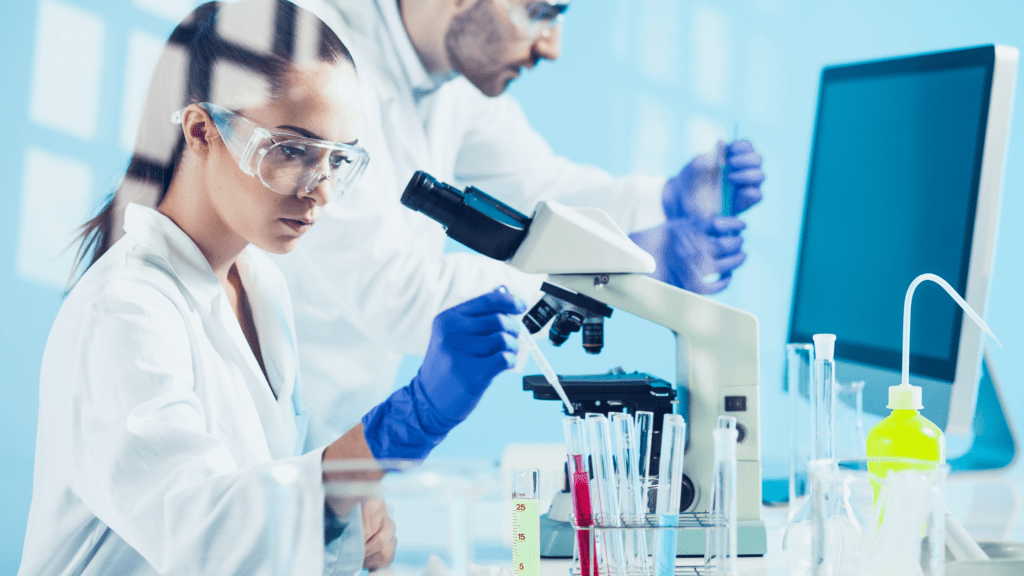Is it really worth hiring a scientific translator who is also a native-English speaker for your German-to-English translation needs? Or could a generalist whose first language isn’t English work as well? If you’re translating a scientific paper for a journal, an academic paper, or a technical text relating to a scientific topic, then the short answer is that you need a specialist.
And here are some of the reasons why.
Why a scientific translator?
A scientific translator is a professional who specialises in the translation of scientific documents and research papers from one language toanother – in my case, from German to English. As opposed to someone who has a good mastery of both languages, a translator with a scientific background will have a unique combination of strong language skills paired with a deep understanding of specific terminology and concepts that apply to your field or niche.
Consider scientific translation to be a subset within the broader field of technical translation, which may be more applicable to engineering, IT, or automotive, for example.
As a native English speaker with a degree in Chemistry and German and industrial experience, I work as a scientific translator with a broad range of clients in the chemical industry. My expertise lies in the translation or editing of documents that relate to chemical coatings, analytical techniques, or the food industry, for example.
If you’re looking to hire a translator for your next project, working with a scientific translator offers the following benefits:
- Specialised subject knowledge – you’re the expert in your field but it’s always easier to speak scientist to scientist.
- Precision, clarity, and quality control – never fear those language-related comments from your peer reviewers or journal editors again.
- Familiarity with conventions and standards – know that your papers meet author guidelines and I’ll consult the style guides so you don’t have to.
- Cultural and linguistic sensitivity – cultural references can be adapted so that they resonate with your international audience.
- Improved quality and accuracy – precision is vital in the lab and in your reports and manuscripts, your work is in safe hands.
Let’s explore each of these benefits in more detail.
Specialised subject knowledge
A chemical translator can play a pivotal role in facilitating effective communication and knowledge exchange within the scientific and technical community. And that’s even more important if you’re writing for an international audience. As a scientist and expert, you want to maintain your reputation in your field. This is why having material in English that guarantees the integrity and accuracy of your research is key.
A scientific translator is familiar with the complex terminology, concepts, and industry-specific jargon that are typically found in chemical literature. You’ll also find the right translator for you will be well-versed in the scientific principles, analytical techniques, and regulations governing these industries. And you need these qualities in a professional, to ensure the end product conveys the intended meaning of the source text.
My unique combination of studies and professional experience gives me a deep understanding of scientific and chemical terminology and concepts. Some of my recent projects include translating technical papers, articles, or texts in the chemical field that cover topics such as yeast digestion, food ingredients, and paint additives.
Given the intricacies involved in these subjects, I believe that collaborating with translators who have a solid background in scientific disciplines is how you ensure precise and nuanced translations. You want to work with someone who knows your industry, understands your market, and can help you get the results you need.
Precision, clarity, and quality control
Scientific translation requires a precise and accurate rendition of scientific concepts, methodologies, and findings. Working with a chemical translator will help you maintain clarity in your texts and ensure that the translated piece represents the original content accurately. And this is especially true when it comes to subtleties and nuances in meaning.
For example, the German term Verlauf can have multiple meanings depending on the context. A quick look at a dictionary will show you 17 different options for translating this word into English, and that doesn’t even cover all the possibilities! Verlauf is often used by scientists to refer to the curve of a graph. In the paints and coatings industry, it is often used to describe the levelling properties of a coating. Verlaufsmittel is a levelling agent – an important additive in many coating formulations to eliminate surface defects and achieve the desired surface finish. This nuance would be incredibly hard to grasp and translate correctly for someone without the relevant experience and background.
If you were to hire a generic translator or do the translation yourself, you’d run the risk of having inconsistencies or even mistakes creep into the English translation. Depending on the text, this may have an impact on whether your paper is accepted or whether it’s able to hit the goal it was created for (for example, obtaining extra funding for your research).
Often, errors can be hard to spot until it’s too late, and you may find yourself in a situation where you need to spend additional time or money making changes and correcting terminology later down the line. And that’s simply an added cost not worth incurring. Accurate and error-free translations are definitely the way to go.
Familiarity with conventions and standards
Another benefit of working with a scientific translator is that they’ll have a good grasp of the conventions and standards of scientific communication. For example, my unique skill set and experience put me in a great position to understand specific writing styles, formatting requirements, and terminology expected by scientific journals.
If I’m not familiar with a particular publication, I’ll thoroughly research the author guidelines before working on the translation or editing. Making sure your paper fits requirements helps streamline the submission process and increases the chances of your paper being accepted for publication.
You can do this yourself, but it doesn’t hurt to have another pair of eyes and a different perspective to help edit and summarise lengthy abstracts, for example. Together, we can ensure your paper meets the submission requirements, make it more impactful and cut down the need for further rounds of revision.
Also, someone with a chemical background will be able to adapt your translation to suit the target audience – be it researchers, regulatory authorities, or the general public. When it comes to translating chemical and scientific texts, hiring a translator with subject-specific expertise who can comply with the standards of scientific communication will enhance the reach and impact of your work.
Cultural and linguistic sensitivity
This piece of research shows that the frequency of language-related rejections for papers translated into English is 2.6 times higher for non-native English speakers. So if you’re in need of a scientific translation into English, a specialised translator who is also an English-native speaker is the best avenue to ensure your piece is accepted and translated to a high standard.
Why? Because a scientific translator who is also a native speaker of the target language you wish to translate into will consider local scientific practices, linguistic preferences, and cultural nuances. The end result is a translation that fully resonates with the target audience – one that flows smoothly and naturally without any awkward or clunky phrases.
But you also want your end product to be clear, coherent, cohesive, and easy to understand and to capture the idiomatic expressions of the target language. A great translation will read so well that it’ll give no hints of being a translation at all – almost as if it was originally written in the target language.
Often, when a German client requires my editing service, they’ll ask me to have a look and check the text for spelling and grammar. But a lot more goes (or should go) into that process. It’s about finding more idiomatic ways of saying something that strike a chord with your international reader. You want the text to sound polished, elegant, engaging, and native-like. Because that’s how you’ll get your findings, ideas, or concepts to better resonate with your audience. And that immediately increases the impact of your work.
Enhancing your text
The best way to illustrate this is with an example. A non-native English speaker writing with a German structure in mind (and a typical instance of a text that might land on my desk for editing) would be:
“The detected by microscopic examination particle was found at 250 nm.”
An English speaker checking for grammar and spelling may simply edit that to:
“The particle, detected by microscopic examination, was found at 250 nm.”
However, a better rendition of this sentence (now rephrased for clarity and style) would read:
“Microscopic analysis revealed the critical particle at 250 nm.”
While the scope for some of my editing projects doesn’t always extend to this, as a native-English speaker and a professional who is invested in her work, I will always add comments and suggestions for areas that could be improved or re-phrased.
While the original translation may not be incorrect, there could be ways to make it more impactful. And being familiar with the German construction of a sentence and a native English speaker, I’ll always strive to make a translation the best it can be. It’s not just about basic spelling and grammar. It’s also about being able to comment on the content and going the extra mile to improve a text beyond the requirements of the brief.
Improved quality and accuracy
When working on scientific texts on chemical topics, scientific translators who have experience working in a lab find it easier to ‘visualise’ the process and steps involved in a sequence. This typically translates to an output of better quality with less room for mistakes and misinterpretations. In other words, a scientific translator is in a better position to find the best way of rendering ideas and concepts.
Scientific texts require absolute precision, and even the slightest error could have a significant impact on the end result. Being able to choose the right vocabulary in the exact context means your translator will be able to maintain the original intent, technical terminology, and integrity of the content. Imagine what inaccuracies or incorrect wording could do to the results or reputation of scientific research, experiments, or even descriptions of industrial processes!
In a nutshell, quality translations ensure that the message is conveyed effectively. And that allows other scientists, researchers, and professionals in your field to access and consume your information. We all know how important it is to preserve the reliability and credibility of scientific literature. Plus, great quality and accuracy also lead to fewer re-works. And when you hire someone to do a job for you, getting it right the first time is a big factor.
Would you like some help with your next translation project?
If you’re looking for an expert translation that presents the best possible version of your company or brand or you’re translating your research from German to English with a view to publishing your work in an international publication or journal, I can help. My aim is to work with you to make your translation the most accurate, effective, and impactful it can be. If you want your reader to take action or generate the international enquiries and sales you need to grow your business, get in touch, and we can achieve that together.





